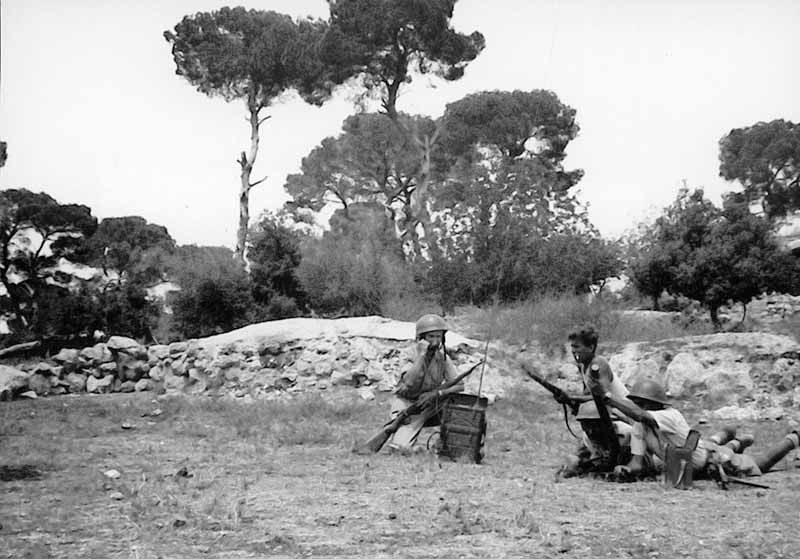The occupation of the Arab village of Saris
On the night of the15.4.48, during the 'Harel' operation, two forces of the 4th Battalion attempted to occupy the village. The population of the Arab village of Saris (Moshav Shoresh) on the road leading to Jerusalem, near the pumping station, used to attack Jewish transport.
On the 15.4.1948, during the 'Harel' operation, two forces of the 4th Battalion attempted to occupy the village. The attack force departed from Ma'ale Hachmisha, flanking the village in order to attack it from the south, while the covering force arrived at the upper pumps building in armored vehicles.
After the attack force was exposed on its way to the village and attacked by snipers, Battalion commander, Yosef Tabenkin, ordered the force to retreat.
On the night of the 16.4.48, a further attempt was made and the Battalion departed from Qaryat El Inab in two forces: one force reached Neve Ilan on foot, and the other, traveled on the road in armored vehicles. The advance force was supposed to occupy the southern summit dominating the village (150 meters above the road).
The Battalion divided into 3 forces:
- Force A, under the command of Haim Pozansky ('Poza'), departed from Neve Ilan and settled on a hill situated north-west of Saris.
- Force B, under the command of Uri Ben- Ari, followed the force A and blocked the road leading from Bet Hasir to Saris.
- force C, under the command of Micha Peri (staff platoon), departed from Qaryat El Inab and settled on a hill situated north of the village.
A covering company including two mortars and two machine guns protected the attack, and Battalion H.Q. settled on the flank behind the attacking force.
Amos Kinamon testifies to a conversation held with Donkelman, a Canadian volunteer: "the orders left him dumbfounded. Where is the wireless? How will the Battalion commander communicate with the second lieutenants during the operation?" He kept on asking: "How will each force know when to move?" Amos responded: "there is a schedule." Donkelman continued: "Where are the heavy weapons- the mortars and the cannons? How can one occupy without reinforcement?" Amos:" We will attack during the night due to the fact that we lack heavy weaponry and reinforcement. We will try to get as close as possible- and attack!"
The dumbfounded Donkelman could not, for the life of him, understand the Palmach methods of fighting…
After the attack force was exposed on its way to the village and attacked by snipers, Battalion commander, Yosef Tabenkin, ordered the force to retreat.
On the night of the 16.4.48, a further attempt was made and the Battalion departed from Qaryat El Inab in two forces: one force reached Neve Ilan on foot, and the other, traveled on the road in armored vehicles. The advance force was supposed to occupy the southern summit dominating the village (150 meters above the road).
The Battalion divided into 3 forces:
- Force A, under the command of Haim Pozansky ('Poza'), departed from Neve Ilan and settled on a hill situated north-west of Saris.
- Force B, under the command of Uri Ben- Ari, followed the force A and blocked the road leading from Bet Hasir to Saris.
- force C, under the command of Micha Peri (staff platoon), departed from Qaryat El Inab and settled on a hill situated north of the village.
A covering company including two mortars and two machine guns protected the attack, and Battalion H.Q. settled on the flank behind the attacking force.
Amos Kinamon testifies to a conversation held with Donkelman, a Canadian volunteer: "the orders left him dumbfounded. Where is the wireless? How will the Battalion commander communicate with the second lieutenants during the operation?" He kept on asking: "How will each force know when to move?" Amos responded: "there is a schedule." Donkelman continued: "Where are the heavy weapons- the mortars and the cannons? How can one occupy without reinforcement?" Amos:" We will attack during the night due to the fact that we lack heavy weaponry and reinforcement. We will try to get as close as possible- and attack!"
The dumbfounded Donkelman could not, for the life of him, understand the Palmach methods of fighting…

